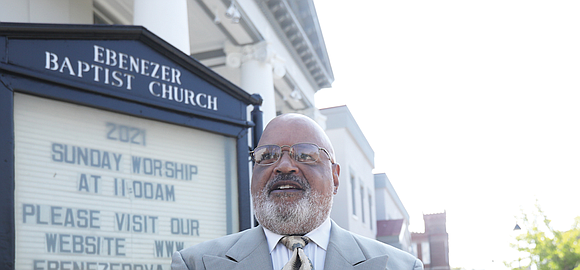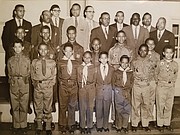Denied their chance
Racism and segregation wouldn’t allow young African-Americans in Richmond to use whites-only pool for life-saving swimming merit badge in quest to become Eagle Scouts
Nichole M. Christian | 9/23/2021, 6 p.m.

J. Maurice Hopkins never wanted this story written.
Truth be told, Mr. Hopkins never wanted his life intertwined with the detail that continues to make this tale poignant more than 50 years later. Had history done right by Mr. Hopkins, this might be a simple story of a well-respected Richmonder looking back on the ways becoming a Boy Scout, at his mother’s insistence, helped shape his life.
Instead, Mr. Hopkins, 74, is the last living member of Richmond’s Black Eagle Scout “should-have-beens,” a bittersweet nickname linking him to a largely unknown slice of his- tory.
Mr. Hopkins said that he and his former Boy Scout buddy, the late William “Bunny” Roane, were given the moniker by the late Linwood D. Ross, their legendary scoutmaster who led Ebenezer Baptist Church’s Troop 478 for more than 60 years.
Prior to his death in May at age 91, Mr. Ross had earned every award available to a troop leader by the Boy Scouts of America. His funeral was filled with tributes and stories of how he shepherded at least 20 Richmond boys on to Eagle Scout, scouting’s highest rank.
For decades, Mr. Hopkins and Mr. Roane were proud members of the multigenerational chorus of Ross supporters. The men also shared a lesser-known bond with Mr. Ross.
“We were his first Eagle Scout candidates,” Mr. Hopkins told the Free Press. “We unfortunately got denied. But he was always very proud of us, knowing what it took at that time to get as far as we did.’’
Mr. Hopkins and Mr. Roane each joined the Ebenezer program as Cub Scouts in the mid-1950s. Together, they soared through the ranks. By the time the two reached high school, they were covered in merit badges — more than 50 between them — all earned under Mr. Ross, and far more than the 21 badges needed to qualify for a shot at the pinnacle of scouting.
“That was a huge investment of time for William Roane and me,” Mr. Hopkins said. “We took it very seriously.”
Yet the era, the segregated South of the 1950s and ’60s, held them back. As Eagle Scout candidates, the young men were required to clear one last critical hurdle — earning their life-saving swimming merit badges.
Mr. Hopkins said he and Mr. Roane were prepared to advance, but the era was not. In the Frederick Douglass District, the district under which Black scouting troops operated, there were no swimming facilities sanctioned as approved testing sites.
“We swam. We took it every summer at camp where we had to pass courses with the lifeguards,” Mr. Hopkins recalled. “All we needed was access.”
The Boy Scouts’ Robert E. Lee Council, the governing body over all scout troops — Black and white — at the time, barred Black scouts from swimming in whites-only facilities.
“It was terribly disappointing,’’ said Mr. Hopkins, a retired Air Force veteran and small business owner. “You take two impressionable young guys, dedicated since 1954 to 1965, Cub Scouts, Boy Scouts, Explorer. I remember what we had to go through to get there (on the precipice of becoming Eagle Scouts) only to have the rug pulled out from under us. It affected both of us. We talked about it all the time.”
Once the scouting district became integrated with access to authorized facilities, Mr. Hopkins said he and Mr. Roane had aged out of the program. “Our opportunity was gone,” he said.
Attorney George Keith Martin, senior partner at McGuireWoods law firm’s Richmond office, is one of Mr. Ross’ 20 Eagle Scouts. While he never heard the story of Mr. Hopkins or Mr. Roane, he believes it’s not only true but that their misfortune probably shaped Mr. Ross’ trademark insistence on excellence.
“He really, really pushed us,” said Mr. Martin, who advanced to Eagle Scout in 1968 at age 14. “Maybe one of the reasons was because of what happened to these men. It’s a travesty to think that they worked that hard and missed out solely because of one badge.”
In 2011, the Boy Scouts National Hall of Leadership welcomed Mr. Ross into its ranks. His acceptance speech included the story of the two young men who had been his first candidates, said Mr. Hopkins, who attended the ceremony at Richmond’s First Baptist Church.
“He called us his ‘should’ve-beens’ and gave a brief explanation of what happened to our chance,” Mr. Hopkins said.
“He knew he did his best,” Mr. Hopkins continued. “But I think he felt he let us down because, as a teacher, father figure and moreover a scoutmaster, which was his life’s work, he couldn’t get over the hurdles of racism, bigotry and the dysfunction of segregation.”
In the decades since, amid sweeping signs of social and racial progress, Mr. Hopkins said the hurt of such clear and purposeful inequality never completely dissolved.
“It affected both of us,” he said of himself and Mr. Roane. “We talked about it all the time, and then we carried it silently. Just one of those things.”
With the deaths of Mr. Roane in 2012 at age 66 and, most recently, Mr. Ross, the memory of a “should’ve been” achievement stings anew.
“There are a lot of circumstances in life where people could’ve been, should’ve been, but weren’t,” Mr. Hopkins said. “My life wasn’t ruined because I was denied. But it happened, and it hurt. You don’t really forget.”
Shortly after Mr. Roane died, Mr. Hopkins went a step beyond remembering. He wrote a letter to the Capital District director of the renamed Boy Scouts Heart of Virginia Council pleading for posthumous Eagle Scout recognition to be presented to the Roane family.
The slight possibility of witnessing a decades-old “social injustice” suddenly made right propelled him.
“If you believe that there’s a chance, just a small one,” Mr. Hopkins said, “you don’t give up. If you believe in yourself, and you’re logical in your thinking, what do you have to lose?”
To his disappointment, the request was denied. The only formal reply was mailed to Mr. Roane’s widow, Mary. In a 2013 letter, a Heart of Virginia Council executive acknowledged that the men “came very close to earning and receiving the Eagle Scout Award,” and also, somewhat indirectly, that they’d likely also been victims of social injustice.
“I suppose that in a different place and time, with access to more local programs and facilities, that both of these men and many other young men, could have and would have completed the requirements to be Eagle Scouts,” wrote Bradford M. Neisheim.
Though the letter went on to note, “...we cannot retrace the steps they’ve taken,” it made no mention of Mr. Hopkins’ request for full posthumous recognition.
The Boy Scouts’ Heart of Virginia Council did not respond to Free Press requests for comment.
“From my vantage point,” Mr. Hopkins said, “a letter to his family recognizing the injustice would’ve been sufficient. I wasn’t asking for myself.”
With the death of Mr. Ross nearly five months ago, Mr. Hopkins is once again reliving and reluctantly retelling the story of what should’ve been. With each recounting, he balances the worry of sounding bitter against a lifelong passion for truth and fairness.
“I’m not bitter, and I’m not clinging to the past, I don’t think,” he said. “The truth is, I was probably the weaker swimmer,” he said with a slight chuckle.
“Maybe I would’ve passed to Eagle; maybe I wouldn’t have. But I’ll never know because I was denied my chance.”






